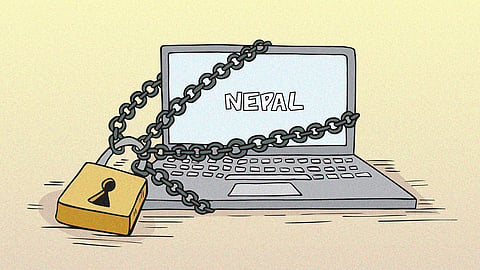The fight to decriminalise same-sex relationships in Sri Lanka - Southasia Weekly #52
This week at Himal
This week, Devana Senanayake writes about the fight to decriminalise same-sex relationships in Sri Lanka, following the path of dedicated queer activists who continue to challenge state and societal oppression.
For our next Podcast of the Week, host of the Southasia Review of Books podcast Shwetha Srikanthan talks to Mumbai-based cinematographer and writer Nusrat F Jafri about her memoir This Land We Call Home, discussing caste oppression, conversions and her maternal family history.
We’re excited to announce Himal Fiction Fest 2025, with an open call for original Southasian speculative fiction. How do you imagine Southasia will be in the year 2500? Send your drafts to editorial@himalmag.com by 1 April.
This week in Southasia
Nepal's proposed digital media bill receives pushback
Nepal’s government is moving to enact new laws to regulate social media that is being met with criticism, with critics fearing the proposed legislation will pose a threat to free speech and press freedom. Under the bill, anyone found spreading false news could face up to three months in prison, or a fine of NPR 50,000, while there are stricter penalties proposed for creating fake accounts for the purpose of spreading harmful or deceptive information deemed disruptive of national sovereignty or national interests, including imprisonment for up to five years. All social media platforms in Nepal are being asked to apply for a government-issued license or face fines.
The Federation of Nepali Journalists has called for public consultation on the bill to ensure that it is in line with the Nepali constitution and international human rights principles. Critics also note that the draft bill is giving the government the power to order content removal without judicial oversight, and have also raised concerns about the vague language around the offences. In the past two weeks, Pakistan has passed a bill making it a criminal offense to share false information, imposing a three year prison sentence and a fine, with journalist groups also criticising the amendments. Across the region, India, Sri Lanka, Bangladesh and Myanmar have laws or state-appointed committees aimed at curbing false news, though India’s IT rules also allow for judicial oversight.
Elsewhere in Southasia
At least 104 Indian citizens deported from US on 4 February, India’s foreign minister says working with US to ensure no mistreatment ahead of prime minister Modi’s visit to US
Bangladesh’s student protesters announce formation of new political party following week-long public consultation
Pakistan sets deadline of 31 March for Afghan refugees awaiting resettlement in the West, impacting up to 40,000 Afghan refugees still in Pakistan
Hundreds of youth including teenagers under 18 kidnapped in Myanmar’s Mandalay, Bagan cities in forced conscription drive as fighting between military junta and anti-junta groups continues, with military extending state of emergency for another six months
India American and former Seattle council member who fought casteism in the US denied an Indian visa to visit her sick mother
Bangladesh protesters set fire to the home of ousted Prime Minister Sheikh Hasina’s father, Awami League supporters after Hasina delivered a speech in exile exhorting her supporters to stand against the interim government.
Sri Lanka’s Human Rights Commission asks government institutions, law enforcement to refrain from harassing human rights activists advocating for rights of Rohingya asylum seekers in new report
Taliban suspends operations of Kabul-based Radio Begum, Afghanistan’s only women’s radio station after 4 February raid
Wildfires spread unchecked in three mountain districts of Nepal exacerbated by impact of climate change, human negligence
Sri Lanka’s chief government whip claims former MPs influenced government officials to overestimate damage caused to their houses during protests around Sri Lanka’s economic crisis; LKR 1.2 billion claimed in damages by 43 MPs
Only in Southasia!
AI is all the rage these days - and this week, an Indian engineering student saw a business opportunity when a user on X (formerly Twitter) shared a photo of her perfectly round roti. He suggested (and claimed to have built) an AI tool that was able to rate roti-roundness - giving it a score of 91 out of 100. What started off as a joke turned serious when the roti maker began trending on Google, prompting the student to search for an investor to acquire the domain rotichecker.ai in order to try and make the tool a reality. Reactions were mixed, with many asking why there was a need for such a tool in the first place (apart from policing people - especially women - on the roundness of their roti). We’d like to gently suggest that the student ask chat GPT whether his idea makes sense next time.
From the archive
India needs a caste census - and Southasia does too (January 2024)
This week, as Telangana Assembly passed a resolution calling for a nationwide caste survey, Anil Varghese and Nawal Kishore Kumar’s article from January 2024 is worth revisiting. Varghese and Kumar write that a caste census can potentially put an end to communal politics, as such a survey could push the envelope on caste representation in education and employment.

